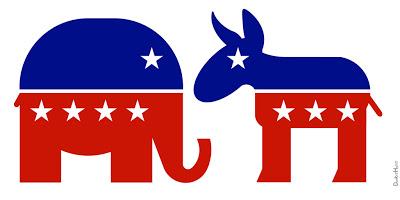 It is widely known by now that the Republicans had some problems in the electorate in the last election -- problems that look like they could cost the party even more dearly in coming elections. I am of course talking about how poorly the party did with the minority vote. The Republicans lost over 70% of the Hispanic, African-American, Asian, and other minority community voters. While the GOP recognizes the need to reach out to minority voters, they seem to think they can do this by finding minority "tokens" and by softening their rhetoric. But they are not yet willing to do the one thing that might actually be effective in that outreach -- moderating their policies ( which are unmistakably anti-minority and anti-immigrant).
It is widely known by now that the Republicans had some problems in the electorate in the last election -- problems that look like they could cost the party even more dearly in coming elections. I am of course talking about how poorly the party did with the minority vote. The Republicans lost over 70% of the Hispanic, African-American, Asian, and other minority community voters. While the GOP recognizes the need to reach out to minority voters, they seem to think they can do this by finding minority "tokens" and by softening their rhetoric. But they are not yet willing to do the one thing that might actually be effective in that outreach -- moderating their policies ( which are unmistakably anti-minority and anti-immigrant).That would be a serious enough problem for the Republican Party, since the percentage of white voters will continue to drop in coming elections as the percentage of minority voters increases -- but that may not be the only problem. Some political scientists believe that young people set a pattern with the first couple of elections they participate in, and will continue to vote for the party they chose in those elections for the rest of their lives. If that is true (and I believe it is), the the electorate is going to be increasingly Democratic in the coming years -- because President Obama has attracted a large percentage of young people to vote Democratic in the last two elections (and it is very likely that Hillary Clinton will do the same in 2016).
And like the minority voters, it is the ultra-right-wing policies of the Republican Party that is driving young people to vote Democratic. A failure to moderate those policies (especially on social issues) will just continue to allow young people to set voting patterns that favor Democrats in coming elections -- voting patterns that for most will last a lifetime. Here is some of an excellent article in The Atlantic on this issue (and I urge you to read the whole article):
Has Obama turned an entire generation of voters into lifelong Democrats? The answer, according to political scientists who study partisanship, may well be yes. Voting for a party is a habit, they say, and the habit tends to stick. The Americans who came of age under FDR leaned more Democratic than the electorate as a whole for the rest of their voting lives. Many of today’s oldest voters—who broke for Mitt Romney by a wider margin than any other age group—cast their first, formative ballots in the Eisenhower years. And the Reagan era (spanning his 1980 election, his 1984 reelection, and the 1988 election of his vice president, George H. W. Bush) had a particularly marked effect on the rising voters of the 1980s. The Americans who entered the electorate during that time have remained disproportionately loyal to the GOP compared with voters overall.
In their 2002 book, Partisan Hearts and Minds, the political scientists Donald Green, Bradley Palmquist, and Eric Schickler argue that party loyalty is a tribe-like social identification. Despite parties’ shifting stances on issues, and despite changes in personal beliefs over time, voters tend to continue to affiliate with the same political party. . .
There’s even intriguing new evidence that the act of voting can itself strengthen party loyalty. In a not-yet-published paper, Elias Dinas, a scholar of U.S. politics at the University of Nottingham, compared first-time voters in the 1968 presidential election with people who were otherwise similar but who didn’t vote that year. Dinas found that Nixon voters were subsequently more Republican, and Humphrey voters more Democratic, than peers who hadn’t voted—an indication that casting a ballot makes a person more partisan.
To be sure, not every president bends the electorate toward his party. Pols like Nixon, Clinton, and Bush, who were hardly known for inspiring youth movements, left the electorate much the way they found it. But to Laura Stoker, a UC Berkeley political-science professor who studies partisanship, the fact that young Obama supporters have affirmed their allegiance in two consecutive presidential elections may herald a generation of Democratic-leaning voters that will skew the composition of the electorate far into the future. “The consistency of young people’s support for Obama in 2008 and 2012 suggests a pattern similar to the 1980s,” she told me. “They are going to be more Democratic than they would have otherwise been, because the character of the first votes cast produces or reinforces a Democratic leaning.”

